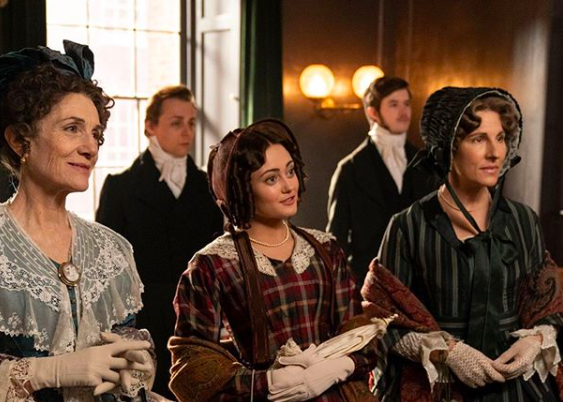‘Belgravia’ is a British periodic drama series produced by John Alexander that revolves around the lives of upper-class families in the heart of London. The crux of the series is Trenchard’s family and their evolution to the upper ring of English society during the Victorian Era. Now, with such a prominent historical setting, it’s hard not to wonder if any true events inspired the story. If you are interested in the same, here is everything you need to know.
Belgravia: An Adaptation of Julian Fellowes’ Book
No. ‘Belgravia’ is not based on a true story. It is based on a book titled the same, written by Julian Fellowes, also the author of ‘Downton Abbey.’ The plot of the series is in tandem with that of the book. Though based on fiction, the two events that form the series’ premise are taken from real events in history. In addition to this, the latter part of the series is set in Victorian London during the time of the Industrial Revolution. Like many periodic dramas, ‘Belgravia’ weaves its fiction in the backdrop of monumental historical events and periods.
Duchess of Richmond’s Ball and The Battle of Waterloo
The ball in the series is inspired by the event hosted by Duchess Charlotte of Richmond in 1815, right before Quatre Bras, which worked as the precursor to the Battle of Waterloo. The Duke of Richmond had the official duty to protect the city from Napoleon Bonaparte’s advancing force.
The ball is famous for another reason apart from its grandeur and all the officials who attended it. During this ball, the Duke of Wellington commanded all the high-ranked officials present at the ball to march to battle in the face of threats from Bonaparte’s side. It is believed that they left for battle without having much chance to change their clothes. Napoleon Bonaparte rose to prominence during the peak of the French Revolution. He was defeated at the Battle of Waterloo, by Duke Wellington’s coalition and the Prussian army. This marked the end of Napoleon Bonaparte’s historical career.
The periodic drama uses this ball hosted by the Duchess of Richmond and the Battle of Waterloo to understand the motives and cause for tension in the Trenchard family that soon unravel. The series, very much like ‘Downton Abbey,’ focuses on the class politics present in London at that time in history. Sophia Trenchard’s whirlwind romance greatly impacts the legendary ball’s aftermath.
Class Dialogue and the Industrial Revolution
The series delves right into the heart of elite upper-class standards and the rift it causes in society. Noble and traditionalist cultures all around the world in history are famous for their harsh and ruthless treatment of not only the poor but also the ‘newly rich’ families, whose popularity and entry into the social hierarchy is looked at with downcast eyes. The double standards of English society and its preoccupation with pure lineage are well known through novels like ‘Pride and Prejudice’ or ‘Lady Chatterley’s Lover.’ It wasn’t until the Second World War that much of the English society saw a shift in this paradigm.
The second event in which the series grounds itself is in the Victorian Era. This period in history is famous for the growth of the Industrial Revolution. Though the hierarchy system remained more or less the same, the series shows how merchants like James Trenchard could amass wealth due to the opportunities provided by the Industrial Revolution. This economic prophecy would cause a significant downfall of the English society’s ardent observance of class hegemonies. The Industrial Revolution gave impetus for people born out of nobility a chance at economic prosperity.
At the transition junction, the series grounds itself in the realities and possibilities of its time. Sophia’s love affair provides the plot with the much-required secret of an English family. In this manner, it keeps the domestic political front of the show in the conservative morality of its times. However, the overarching political framework is that of change as James Trenchard goes from being ‘the magic man’ who provided supplies during the war to a wealthy businessman. Though not born in a high rank, he is able to carve out his social stand with the traditional elitists.
Read More: Best Historical Dramas on Netflix

